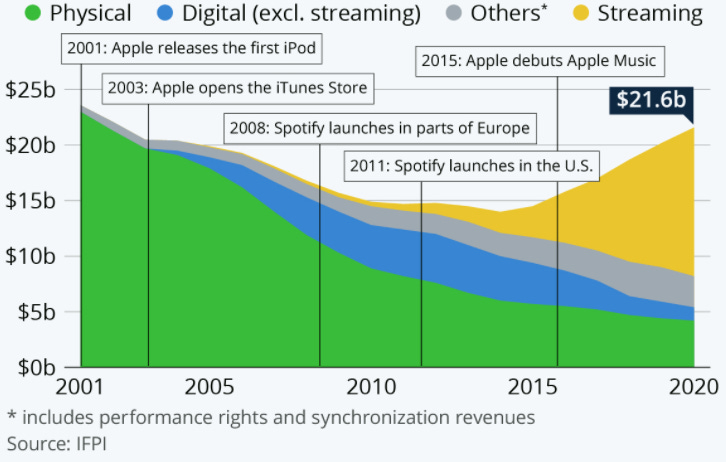The last decade has been great for the global music industry. After many years of declining revenues due to the decline of CDs and other physical media, the advent of streaming has injected new life.
Global recording industry revenues
Source: Statista
Companies like Spotify make tons of money streaming music and music production companies like Universal Music Group aren’t far behind. But I think the current golden age may spell doom for the next decade and put music companies on the path of airlines and railways.
To see why this may be the case you should read a great article in the Atlantic magazine called “Is Old Music Killing New Music”? In it you will find some interesting statistics, like the fact that “new songs” (i.e. songs less than 18 months old) now account for less than 5% of total streams in the US, down from more than 10% in 2018. Over the last decade, the TV audience for the most important event in new music, the Grammy Awards, has halved.
And if you think (like me) that this is because newly released music has become more boring and uniform then you are not wrong. The musical difference in Billboard Hot 100 Hits has peaked in the 1970s and steadily declined since then. Meanwhile, the average number of writers per song has increased from 1.82 in 1961 to 2.82 in 2000 and 5.1 in 2017. You know the saying “A camel is a horse designed by a committee”? That is what is happening to pop songs. And it is not just that the writing teams get larger. The top producers get a bigger and bigger share of the market. In the late 1980s the top 10 producers were responsible for 19% of the Billboard Hot 100 songs. By the late 2010s that number was 32%. No wonder new songs increasingly sound the same. They all come out of the same small number of factories.
And this is where the problem for the music industry starts, in my view. They aren’t investing in new artists or diverse talent anymore. In the past, the royalty income from older artists and successful hits would be used to launch the careers of new unproven artists. Music companies essentially acted like venture capitalists. They invested a small amount in a large number of unproven assets and while most of these assets were unsuccessful and ended in a loss, there was the occasional superstar born out of this process.
Today, music companies act like a utility company. They either own or buy the back catalogue of major artists and generate stable cash flows from streaming and reproduction rights. These cash flows are then directly handed over to investors in the form of dividends or share buybacks. The most direct form of this utility-like behaviour are the music royalty funds launched in the London Stock Exchange. Don’t get me wrong. As an investor, I think these funds are great. But for the future of the music industry, they are a problem.
It reminds me of airlines and their relentless effort to stop providing comfort and experience to passengers and instead focus on cutting cost and generating maximum profit out of passengers. No frills airlines have been great for investors, but they made flying a misery or all of us because in a competition with these low cost airlines, established airlines had to enter into a price war and cut costs where possible, thus levelling down the experience for all of us. Similarly, manufacturers of desktop PCs like Dell or IBM entered a price war to deliver the cheapest computer possible to the masses. The result was that these PCs and the software on them became more and more homogenous and at the same time less reliable. And these companies did not invest in new technologies or even sold technology to disruptors who then became bigger than they were. Xerox famously developed the computer mouse, but it was Apple that used the technology. And IBM developed the digital operating system for its computers (DOS), which was then turned into MS-DOS by Microsoft and turned that company into one of the largest in the world.
The music industry has become fat and self-satisfied and they are all too happy to just let the money roll in and count their profits. And that is why I think the industry will have a problem in the future. Music is a creative business and that means you have to constantly innovate. If you don’t do that, there are two possible outcomes. Either an upstart comes along and revolutionises the whole business (this is what happened when Steve Jobs launched the iPod or the iPhone and this is what Elon Musk did to the entire car industry) giving it new life but relegating established players to also-rans. Or, alternatively, the entire industry will become obsolete and suffer a slow decline until nobody cares anymore. How many of my readers own railway stocks? I thought so.





Thanks for sharing your thoughts.
I would add that changing consumer sentiments (there are so many other worthy and unworthy distractions) is also likely affecting this. Are people "listening" to music as background noise while doing other things like surfing the internet or playing games.
Perhaps the story is better told if you were to trend revenues from recordings, YouTube streams and live concerts divided by population. The splits likely have have changed, but perhaps the per capita spend has not?
Very interesting as always. It's curious to see vinyl sales going through the roof at the same time, likewise cutting off smaller musicians from global printing capacities: https://www.nme.com/news/music/vinyl-record-sales-in-2021-at-highest-level-for-30-years-3127074